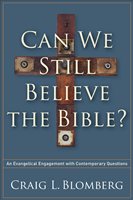About the Author
Craig L. Blomberg (PhD, University of Aberdeen) is distinguished professor of New Testament at Denver Seminary and the author or editor of numerous books, including A Handbook of New Testament Exegesis, Jesus and the Gospels, and The Historical Reliability of the Gospels.
Overview
This book is both personal and scholarly. Blomberg discusses how his faith in the trustworthiness of the Scriptures has been strengthened through his years of academic research, teaching, and writing. He examines six key challenges to the Bible’s reliability and accuracy, and demonstrates how they all fail to prove that the Bible contains errors. Blomberg engages with both liberal and conservative scholars, arguing that some individuals in both camps are making it difficult for believers to trust the Bible–the former often self-consciously, the latter unintentionally.
The first major issue Blomberg tackles is the textual transmission and accuracy of the manuscripts that are used for Bible translation. After establishing the quality of the extant texts, he moves on to consider the formation of the canon. Once the decision about canon is made, the next logical question concerns the best way to translate the canonical texts into receptor languages. These three major issues form an interlocking set. Continuing to build on this foundation, the last three issues Blomberg examines deal with the content of the Scriptures. Even if it is granted that we have accurate copies of the original texts, that the right texts were included in the canon, and that the texts are adequately translated, it does not necessarily follow that what the biblical texts record is true. Blomberg examines issues of inerrancy, questions about the historicity of what the Bible records, and the naturalistic claim that the accounts of miracles in the Bible prove that it is mythical.
Table of Contents
Introduction
1 Aren’t the Copies of the Bible Hopelessly Corrupt?
2 Wasn’t the Selection of Books for the Canon Just Political?
3 Can We Trust Any of Our Translations of the Bible?
4 Don’t These Issues Rule Out Inerrancy?
5 Aren’t Several Narrative Genres of the Bible Unhistorical?
6 Don’t All the Miracles Make the Bible Mythical?
Conclusion
Notes
Scripture Index
Subject Index
Summary
Chapter 1.
Aren’t the Copies of the Bible Hopelessly Corrupt?
Before we can question the accuracy of what the biblical writers wrote, we need to determine if we actually know what they wrote. Do we have reason to believe that the manuscripts that exist accurately preserve what the original authors wrote? Teachers like Bart Ehrman have written extremely influential books that cast doubt on the integrity of the biblical manuscripts. Often, without any context, it is asserted that there are 400,000 NT textual variants. When more study is done, however, it becomes apparent that such a large number represents one extreme guesstimate, and that there are many factors that make it far less problematic than it first sounds.
Textual critics have well-founded rules by which they determine original content. There are only two passages in the entire NT where …
[To continue reading this summary, please see below....]
The remainder of this article is premium content. Become a member to continue reading.
Already have an account? Sign In
Buy the books

Can We Still Believe The Bible? An Evangelical Engagement With Contemporary Questions